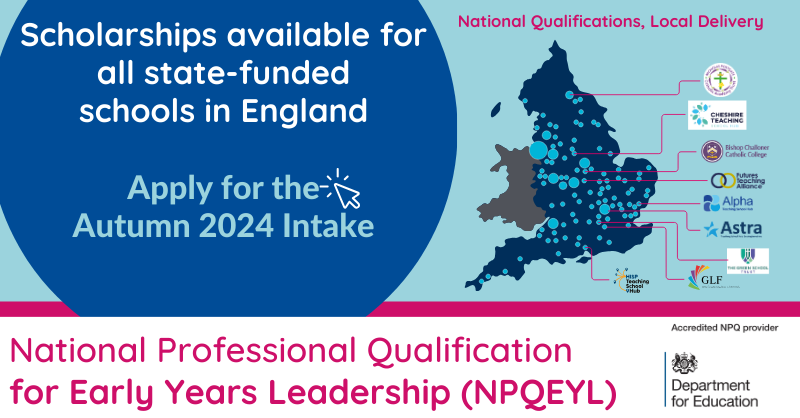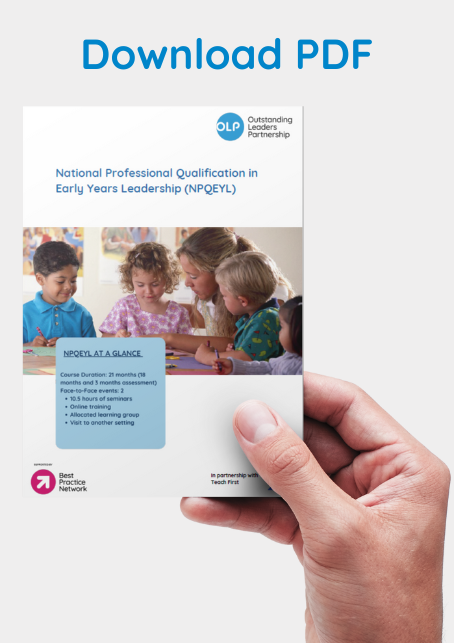National Professional Qualification for Early Years Leadership (NPQEYL)
- managers of Private, Voluntary and Independent nurseries
- headteachers of school-based or maintained nurseries
- childminders with leadership responsibilities
Best Practice Network is proud to be working with Teach First to deliver NPQEYL.

What are the benefits?
- Deliver meaningful change in your setting - Get the tools to establish and – more importantly— sustain your organisation’s strategic direction. Learn how to create an effective culture and align your staff in your school’s mission
- Join a network of like-minded leaders - Become part of a community of leaders across Early Years settings and contexts who share a passion for addressing educational disadvantage. Build valuable connections with other leaders from across the country and learn how they faced and overcame similar challenges
- Grow your expertise - Broaden your leadership knowledge and gain the specialist expertise needed to tackle your organisation’s improvement priorities with content covering the breadth of knowledge you need as a leader
- Build a supportive environment for colleagues - Create a thriving environment in which all staff feel supported and valued with opportunities to develop
How is NPQEYL delivered?
This 21-month programme (18 months’ delivery and three months for assessment) consists of a series of modules based on the DfE’s NPQ frameworks. Each module cycle features:
- evidence-based online content to refresh and build knowledge, as well as exemplify what this looks like for your role and level of leadership
- a formative assessment task to support your learning
- a face-to-face seminar with a group of peers, facilitated by a serving leader from an Early Years setting – you’ll analyse and reflect on the task and hear further examples of good practice
- the opportunity to record reflections and consolidate learning.
This cycle repeats throughout the programme, with implementation a consideration in every module. Towards the end of the programme, you’ll also take a module focused specifically on effective implementation. This provides an opportunity to plan a strategic improvement, focused on your context and pupils. There will be ongoing support through a seminar group and discussion forum.
During the Practical Implementation cycle, programme members will be required to put learning into practice and implement an improvement, or plan the implementation of an improvement, in their setting based on the NPQ programme they are working towards. The focus will be identified by the programme member and must be level appropriate. This improvement should be a stretching professional development target within the programme member’s existing role. For aspiring specialist and leadership programme members, the school/employer should support them to implement an improvement at the aspiring level. The allocation of learning time is five hours so any implementation focus should be feasible within the timeframe.
What will I learn?
You’ll develop expertise in the knowledge, skills and concepts for leading an Early Years setting. These include best practice around child development and additional and specialist educational needs, as well as culture, organisational management and partnerships you may make as the leader of an Early Years setting. Our content is informed by the best and most recent evidence and developed with input from serving leaders and subject matter experts.
Our programmes have a practical focus. You’ll be supported to make small but important changes to your and others’ practice throughout the programme. This will conclude with the implementation module and practical implementation cycle of the programme.
What are the training commitments?
Over the course of the whole programme (spread over five terms), you’ll undertake 77 hours of learning. This includes a combination of seminars, learning modules, conferences and a practical learning cycle.
How will I be assessed?
The assessment process for all NPQs has been refreshed to reduce the workload burden on teachers while still providing an opportunity to apply their knowledge. To pass the programme, you’ll need to engage with at least 90% of the course and pass one assessment.
There is no ‘project’ like with previous NPQs. The assessment has been updated with reformed NPQs to try and minimise workload.
Assessment takes place within three months of you completing your NPQ programme. Detailed dates will be shared with you before the start of the programme.
Throughout the programme, you will participate in formative assessment tasks, so you can track your progress and understanding. This will also support you to demonstrate 90% engagement with the course.
At the start of your training, we’ll also provide you with the dates of the Summative Assessment so you can plan for this with your school. This will take the form of a case study which is a minimum of 2,000 words in length and will cover content referred to in the relevant NPQ Content Framework. It will represent a likely situation to be faced by a teacher at the relevant NPQ qualification level or role and will allow you to demonstrate your understanding of the relevant NPQ Content Framework and offer you an opportunity to demonstrate that you can successfully apply this.
You will have an eight-day window to provide a written response of a maximum of 1500 words for the case study (unless adjustments are required on an individual basis) in an ‘open book’ setting. You will receive the unseen case study question at the start of the eight-day window; and submit your response by midnight of the eighth day.
NPQEYL Framework
The DfE’s NPQEYL framework is based on a robust method of design and development, building on the evidence base and expert guidance already established in the ECF and the ITT Core Content Framework. The NPQ frameworks reflect the Teachers’ Standards and Headteachers' Standards to ensure coherency with the requirements already used by the teaching profession.
Please see the NPQEYL Framework below or download here.
Who is this for?
NPQEYL programme is for leaders qualified to at least level 3 with a full and relevant qualification* who are, or are aspiring to be**:
- managers of private, voluntary and independent nurseries
- headteachers of school-based or maintained nurseries
- childminders with leadership responsibilities (you work with, employ or are close to employing an assistant).
*qualifications that demonstrate the depth and level of learning appropriate to specified outcomes of full Early Years, childcare or playwork qualifications. The qualification should have valid, reliable assessment and awarding procedures and must include an element of assessed performance evidence. To check whether your qualification meets these criteria, please visit ‘Early years qualifications achieved in England’. While not a mandatory requirement, it is expected that NPQEYL participants will hold a “full and relevant” Level 3 qualification (or higher) prior to starting the course.
In settings on the Early Years Register, the manager must hold an approved level 3 qualification or above and at least half of all other staff must hold at least an approved level 2 qualification. The manager should have at least two years’ experience of working in an early years setting, or have at least two years’ other suitable experience.
These qualification requirements do not apply to childminders. However, childminders must have completed training which helps them to understand and implement the EYFS (Early Years Foundation Stage) before they can register with Ofsted or a childminder agency.
**To fully benefit from the NPQEYL, we would expect that prospective participants who are aspiring managers have opportunity within their role to practise and embed the learning from the course. We would expect that they are close to applying for leadership/management positions, and/or hold a deputy manager/room leader role in their current setting
What does it cost?
The National Professional Qualification for Early Years Leadership (NPQEYL) costs £1090 plus VAT if applicable.
NPQ scholarships for the Autumn 2024 Cohort are extremely limited, so please apply as soon as possible to avoid disappointment.
The limited funding will target those teachers and leaders who work in the most challenging schools or educational settings, serving more disadvantaged communities. The limited scholarships will cover the full NPQ course cost and will be available to teachers and leaders from:
- The 50% of schools with the highest proportion of students who attract pupil premium funding
- 16 to 19 educational settings identified as having high disadvantage
- All scholarships are subject to availability - apply now for the best chance of receiving a scholarship!
NPQLT Framework
The NPQ frameworks are based on a robust method of design and development, building on the evidence base and expert guidance already established in the ECF and the ITT Core Content Framework. The NPQ frameworks reflect the Teachers’ Standards and Headteachers' Standards to ensure coherency with the requirements already used by the teaching profession.
Please see the NPQLT Framework below. If your computer or device does not support the Adobe plugin you can download the framework pdf here.
Next Steps
Apply now for the Autumn 2024 NPQEYL Intake.
TRN
All applicants will need a Teacher Reference Number (TRN) to apply for NPQEYL. If you do not have a TRN you can apply for one at www.gov.uk/guidance/teacher-reference-number-trn


